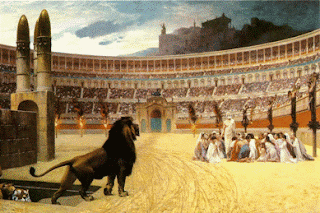Today's my day off and so far I'm spending it with a typically fascinating spin around the biblioblogosphere. Here's three today that pushed my buttons and made me think harder, plus five more worth a look:
First: Michael Barber is looking forward to Mike Bird's new Jesus book, about facets of memorability. I'm sure I'l enjoy it - mainly because it promises to interact with Bauckham & Allison's latest works on the subject - but it makes me wonder yet again, how many more decades of debate about historicity and methodology will readers have to put up with, in historical Jesus research? Sigh. Maybe the process will eventually prove to 'grind exceedingly fine'. Do you think?
Second: Over at Jesus Creed, RJS continues reviewing Peter Enns' new book, The Evolution of Adam. Q&A: (1) Does Adam's historicity affect Paul's theology, really? Maybe. (2) If you told Paul that Adam was 'figurative', would Paul have believed it? Doubtful. (3) But if Paul *had* believed Adam was figurative, would that have changed Paul's view of Jesus? Answer 3: Highly doubtful!
It seems that Enns may have a strong point: however Paul constructed his argument in Romans, its conclusion may not actually depend on the historicity of Adam. However, if the argument's soundness is not in question, what about it's validity? That's why this discussion keeps reminding me of Mathematicians and the impossible-yet-workable concept of the "Infinite Limit", as I once discussed here, in Genesis AS IF History.
Third: Daniel Kirk has been trying to define and explain "Narrative Theology" recently. Apparently, it's how a theologian incorporates historical thinking, which means (=) having a four-dimensional awareness of how ideas and events in real life tend to go through developmental change, as opposed to thinking of everything as if reaching a fixed status for all time. In other words, Daniel's Storied Theology is the next best thing to doing actual History!
Snark aside, I do think Theological Re-Storying has a bit more wiggle room built in than does Historical Re-Storying, mainly because its a different kind of wiggle room. Theologians work more with highly interpretive ideology, whereas Historians can usually point out precisely which blanks they've filled in. At any rate, I suppose I also just illustrated precisely why I have such a love/hate relationship with Daniel's thinking, but I'm very glad that he does keep on sharing it. I'll take a "Storied Theology" any day over "Bible as Instruction Book"; see also Daniel's thoughts on Narrative Theology versus traditional Biblical Theology or Systematics. Yes, contextualized and temporally oriented views of an active God and his ongoing work are far more helpful (I think) than abstracted absolutes and extracted principles, which so often lead to false understanding and misapplication of scripture.
It occurs to me with increasing force that the popularization of Narrative Theology is not unrelated to the endless frustrations of the NT Historical quagmire - all in all, just the next chapter in the History of History.
Fourth through Eighth, briefly: * Alan Knox agrees with the statement, "There are no perfect churches", but also finds it a bit of a cop-out. * Matthew R Malcolm explains succinctly why fundamentalism so often breeds atheism * I'm saving an hour, later, for an in-depth analysis of Mike Bird's treatise on "believing criticism" * Via HOTAW, why it matters that Rome's economic center was farther East than our 'mental maps' usually go * And Mary Beard mythbusted against the common anachronism of imagining Nero in the Colosseum. That's right, the original Christian-eating lions would have feasted in the Circus, where Ben-Hur won that chariot race! ;-)
By the way, is it just me, or does this famous lion kind of look like he's about to get saved?
I'm sure he managed to press through the transformative urge. Cats are always so stoic.
Have a great rest of the week, everyone!

